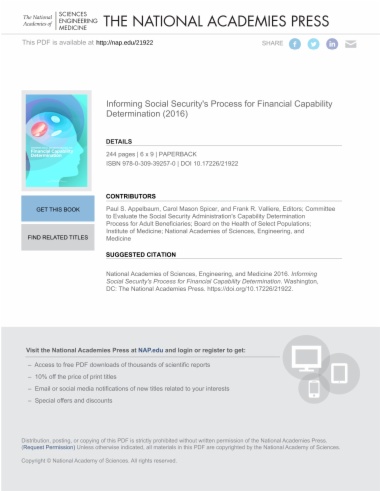

The U.S. Social Security Administration (SSA) provides benefits to disabled adults and children, offering vital financial support to more than 19 million disabled Americans. Of that group, approximately 5.5 million have been deemed – by virtue of youth or mental or physical impairment – incapable of managing or directing the management of their benefits. Hence, a representative payee has been appointed to receive and disburse SSA payments for these beneficiaries to ensure that their basic needs for shelter, food, and clothing are met. Periodically, however, concerns have been expressed about the accuracy of the process by which SSA determines whether beneficiaries are capable of managing their benefits, with some evidence suggesting that underdetection of incapable recipients may be a particular problem.
The importance of creating as accurate a process as possible for incapability determinations is underscored by the consequences of incorrectly identifying recipients either as incapable when they can manage their benefits or as capable when they cannot. Failure to identify beneficiaries who are incapable of managing their funds means abandoning a vulnerable population to potential homelessness, hunger, and disease.
Informing Social Security's Process for Financial Capability Determination considers capability determination processes used by other similar benefit programs, abilities required to manage, and direct the management of, benefits, and effective methods and measures for assessing capability. This report evaluates SSA's capability determination process for adult beneficiaries and provides recommendations for improving the accuracy and efficiency of the agency's policy and procedures for making these determinations.